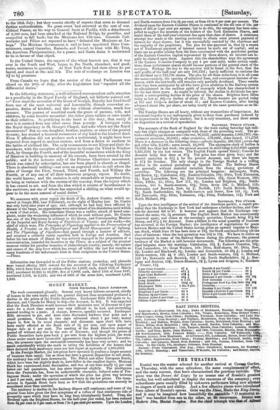In the following statement, a well-informed correspondent calls attention to
a peculiarity in the Royal Family of England, not hitherto pointed out. —"Ever since the accession of the house of Guelph, Royalty has freed itself from one of the most universal and honourable, though somewhat ex- pensive, duties of kindred; and this too without observation, much less censure. The poorest of mankind mark the grave of parents, wife, and children, by some bumble memorial: the richer place tablets or raise tombs to their relatives. So gratifying to the heart is this duty' that rarely if ever is it omitted from any other cause than poverty. A foreigner visits the Royal depository in St. George's Chapel, and asks where are the Royal monuments? But no son, daughter, brother, nephew, or niece of the present dynasty, has erected a funereal monument of any kind to the kindred dead. Even if affection did not produce such a testimonial, it might have been expected from regard to ancient custom, and from a desire to conform to the habits of civilized life. The only monuments to our Kings and their de- scendants, with the exception of the statue to George the Third in Windsor Park, by George the Fourth, and of the beautiful mausoleum which the King of Hanover is building in memory of his consort, have been erected by the public; and in the instance only of the Princess Charlotte's monument, which was raised by subscription, has one been placed in church or chapel. There is absolutely nothing—not even an engraved slab—to tell where the ashes of George the First, Second, Third, and Fourth, and William the Fourth, or of any one of all their numerous progeny, repose. No doubt, the world knows; and the omission is only remarkable or important from Its being at variance with the custom of the country, from the injury which it has caused to art, and from the idea which it creates of heartlessness in the survivors; not one of whom has expended a shilling on what would ap- pear to be the most natural of social duties."


























 Previous page
Previous page